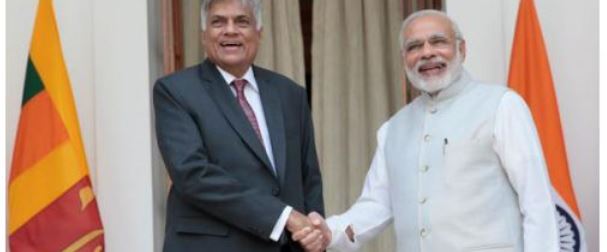NEW DELHI, September 15: Visiting Sri Lankan Prime Minister Ranil Wickremesinghe on Tuesday said his government is looking at devolution of power to the island’s ethnic Tamils under the provisions of the Constitution, an issue India has been pursuing with the island nation.
“We are looking at how power-sharing and devolution takes place within the Constitution, within a unitary state and there is still scope for much more to be done,” he said.
Talking to the media at a joint event with Indian Prime Minister Modi after talks between the two delegations, Wickremesinghe said: “We have had a long discussion on the different areas which concern, which matter to our countries. We have briefed Prime Minister Modi and External Affairs Minister Sushma Swaraj on the developments in Geneva, a favourable outcome which will lead finally to the settlement of issues regarding human rights, reconciliation where all Sri Lankans are treated equally, and we certainly look at the past but together we look at the future.” Wickremesinghe pitched for deeper economic engagement with India and hoped that both countries will be able to finalise the long-pending Comprehensive Economic Partnership Agreement (CEPA) by next year.
On devolution of power to Tamils in Northern and Eastern provinces, he said: “We are looking at how power-sharing takes place within the Constitution.”
India has been pressing Sri Lanka to implement the 13th amendment on devolution of powers to fulfil the aspirations of the ethnic Tamils.
The 13th amendment that followed the Indo-Sri Lankan Accord of July 1987, signed between then Indian Prime Minister Rajiv Gandhi and Sri Lankan President J R Jayewardene, envisaged devolution of powers to the provinces in the midst of the island’s bitter ethnic conflict.
The Sri Lankan leader said various issues, including those relating to ethnic Tamil population, and the UNHRC (UN Human Rights Council) resolution referring to alleged human rights violation in Sri Lanka figured in his talks with Modi.
The UN Human Rights Council had last year adopted a resolution requesting the High Commissioner for Human Rights to undertake a comprehensive investigation into alleged serious violations and abuses of human rights and related crimes by both the island’s security forces and the separatist Liberation Tigers of Tamil Eelam (LTTE) during the ethnic conflict in Sri Lanka.
On the sticky fishermen issue, he said fishermen on both sides should continue discussion and come to a conclusion to resolve it in a time-bound manner.
Wickremesinghe said all political parties in his country want good relations with India. He said enhancing bilateral trade with India will help his country reach the goal of generating one million jobs in Sri Lanka over the next five years.
“We have a Parliament in which all are being represented. The changes we make are to strengthen the Parliament. We give them all a bigger role to play. So that Parliament itself will be involved in this historic opportune moment when amongst others we discuss how there can be stronger and deeper relations between Sri Lanka and India. So it is an all-party effort. I am the first to come here to convey to you all the desire of President Sirisena to continue this relationship.”
He thanked Modi for the help given by India in resettling and reconstruction in the Northern and the Eastern Provinces.
“This also gave us the opportunity to have deeper discussions in regard to security matters of combating terrorism and of ensuring security in the maritime areas of the Indian Ocean where our armed forces and the police could work together. Peace and stability in the region is the key to our success.
“Whenever there is stability in the Indian Ocean, India and Sri Lanka prosper, and when there is instability we get affected. But together with peace we also looked at further cooperation between our two countries, of permanent agreement on cooperation in economic affairs with emphasis on trade and investment and also on technology which is essential for development.
“We are in a unique position that this government has a mandate from the people to continue trade and investment arrangements with India and for technological development together with the other countries. We hope this will lead to the next step, where the private sectors from both sides would cooperate.
“We have been talking on these issues for a very long time, so we think by end of this year, the two sides should at least come to an agreement in principle and a framework document and certainly by mid next year we should have the agreement in place.
He pointed out that economic cooperation between India and Sri Lanka is nothing new. This has been going on for over 2,500 years and if we didn’t have trade between India and Sri Lanka, the two traders Tapassu and Balluka would not have come to Sri Lanka carrying a hair relic of the Lord Buddha!”
We had the occasion of discussing the issue of fisheries in the Palk Strait and the need for the fishermen on both sides, who are also slated to have discussions and hopefully conclude it within a time bound framework. From there onwards an opportunity for all of us to develop in that region also. Tourism was the other area of cooperation that we have been discussing.
So this is just a beginning of discussions, because we hope by mid next year, we will be able to conclude all the agreements and to have the Prime Minister and his key leaders, Ministers all back in Sri Lanka from which our relationship can go to a higher level.
The two sides signed four agreements, and exchanged them in the presence of the prime ministers at the joint media briefing.
